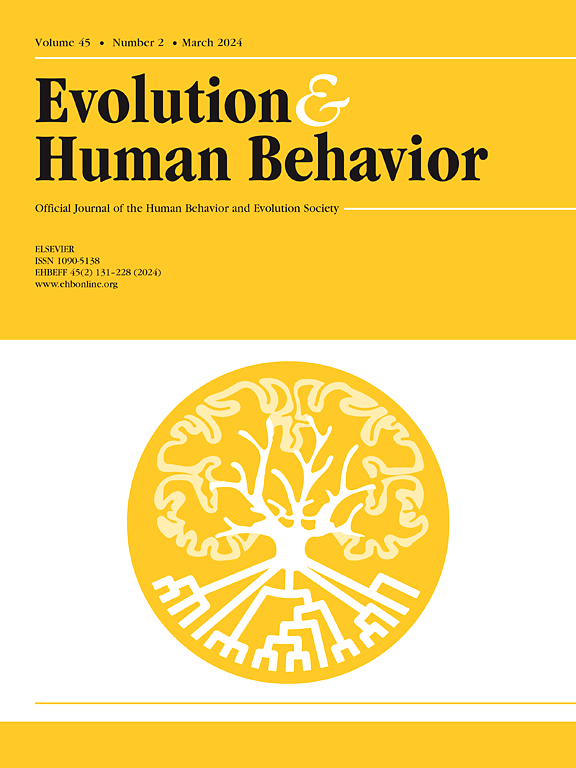Is the Lamborghini like a peacock's tail? No evidence for relationships between conspicuous consumption and male attractiveness
IF 3.2
1区 心理学
Q1 BEHAVIORAL SCIENCES
引用次数: 0
Abstract
Women more interested in short-term relationships prefer men with good genes. We ran four controlled experiments with heterosexual women, based on the idea that conspicuous consumption manifestations signal good genes, to test whether a conspicuous object could increase the attractiveness and desire for an uncommitted relationship with a man. We also tested the interaction between car type (non-conspicuous and conspicuous) and reproductive strategy in the judgment of attractiveness and desire for an uncommitted relationship. Contrary to previous studies, the results of our experiments rejected the hypothesis of conspicuous consumption as an enhancer of attractiveness. None of our studies showed an interaction between car type and sociosexuality. In Study 3, the non-conspicuous car's man was considered more attractive. This effect disappeared after controlling social desirability in Study 4. Perhaps the positive publication bias explains the unprecedented nature of our results. Another possible explanation remains in some cultural influence. Maybe, Brazilian women with a high education level (our participants) are not susceptible to conspicuous consumption as an indicator of good genes. We also want to emphasize that, although other studies have corroborated our hypotheses using similar experiments, the present study was the only one that controlled social desirability and socioeconomic status.
兰博基尼像孔雀的尾巴吗?没有证据表明炫耀性消费和男性吸引力之间存在联系
对短期关系更感兴趣的女性更喜欢有良好基因的男性。我们对异性恋女性进行了四个对照实验,基于炫耀性消费表现表明基因良好的想法,来测试一个引人注目的物体是否会增加吸引力和对与男人保持未承诺关系的渴望。我们还测试了汽车类型(不显眼和显眼)与生殖策略之间的相互作用,以判断吸引力和对未承诺关系的渴望。与之前的研究相反,我们的实验结果否定了炫耀性消费能增强吸引力的假设。我们的研究都没有显示出汽车类型和社会性别之间的相互作用。在研究3中,不显眼的司机被认为更有吸引力。在研究4中,这种效应在控制社会可取性后消失。也许正面的发表偏倚解释了我们的研究结果是史无前例的。另一个可能的解释是文化的影响。也许,受过高等教育的巴西女性(我们的参与者)不容易受到炫耀性消费的影响,这是良好基因的一个指标。我们还想强调的是,尽管其他研究已经通过类似的实验证实了我们的假设,但本研究是唯一一个控制社会期望和社会经济地位的研究。
本文章由计算机程序翻译,如有差异,请以英文原文为准。
求助全文
约1分钟内获得全文
求助全文
来源期刊

Evolution and Human Behavior
生物-行为科学
CiteScore
8.30
自引率
9.80%
发文量
62
审稿时长
82 days
期刊介绍:
Evolution and Human Behavior is an interdisciplinary journal, presenting research reports and theory in which evolutionary perspectives are brought to bear on the study of human behavior. It is primarily a scientific journal, but submissions from scholars in the humanities are also encouraged. Papers reporting on theoretical and empirical work on other species will be welcome if their relevance to the human animal is apparent.
 求助内容:
求助内容: 应助结果提醒方式:
应助结果提醒方式:


